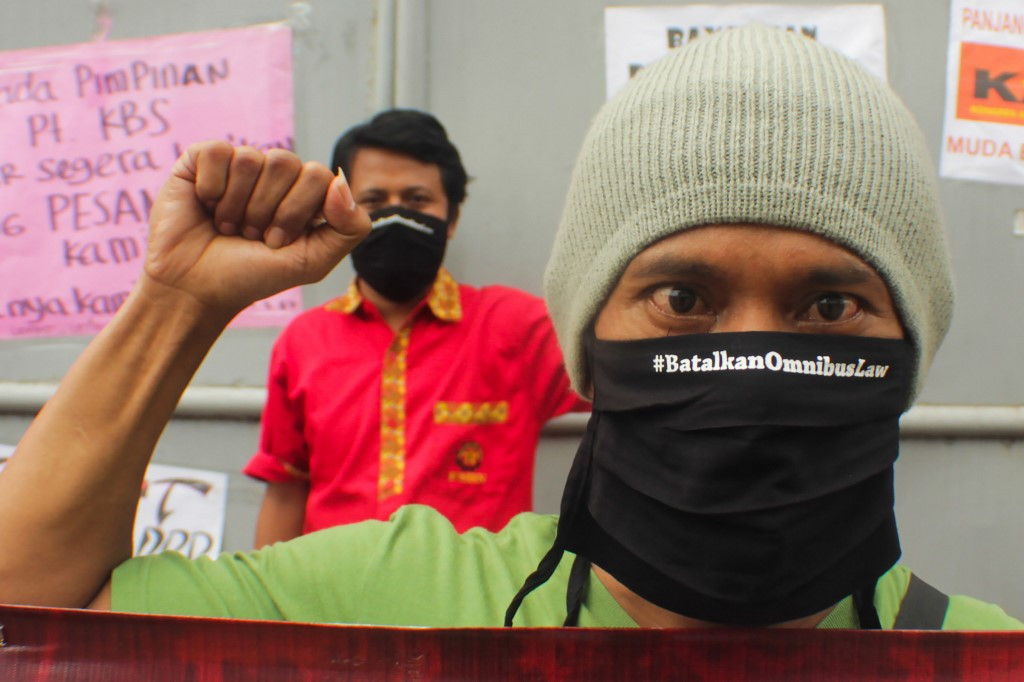Popular Reads
Top Results
Can't find what you're looking for?
View all search resultsPopular Reads
Top Results
Can't find what you're looking for?
View all search resultsBusinesses must have adequate support to prevent layoffs: Experts
Workers in manufacturing and other labor-intensive sectors have been among those hit hardest by the COVID-19 outbreak. The government’s stay-at-home order has effectively halted production in nonessential industries.
Change text size
Gift Premium Articles
to Anyone
A
s COVID-19 arrests most industry activity and disrupts global supply chains, millions of Indonesian laborers face a greater risk of being furloughed or losing their jobs entirely.
The government must now ensure that businesses have adequate support to prevent layoffs, and – where job reductions are inevitable – the government must ensure that workers’ rights are protected, labor experts have said.
“The options [for laborers] are quite limited. If they are dismissed, it is important that they secure full compensation as stipulated by the Labor Law. If they are furloughed, they should get full wages and THR [holiday bonus],” said Hadi Subhan, a labor expert from Airlangga University.
“During the pandemic, what the government can do – and what furloughed or recently unemployed people need – is cash assistance. If this could be done by the government, that would be of great help,” he said.
As the pandemic has hit employers and laborers alike, the government should issue a regulation that ensures the two sides meet if the companies reduce their workforce, University of Indonesia (UI) labor law professor Aloysius Uwiyono suggested.
“There should be a legal basis as a reference for the employers and workers so they are on the same page. Without it, I think it will be difficult for them to discuss severance payment,” he said.
About 375,165 formal workers have been laid off nationwide and 1.03 million formal workers have been furloughed during the COVID-19 crisis, while 314,833 informal workers have lost their livelihoods, according to data from the Manpower Ministry.
The government predicts that 2.9 million to 5.2 million workers could lose their jobs during the outbreak.
If that becomes the case, the additional unemployment would erase last year’s gains of 2.5 million new jobs.
Statistics Indonesia (BPS) data shows that 7.05 million people – 5.28 percent of the workforce of 133.56 million – were unemployed as of August 2019.
Data from the Office of the Coordinating Economic Minister shows that 15,747 factories remain in operation in regions where large-scale social restrictions (PSBB) have been applied – about a third of the approximately 40,000 manufacturers that operate under normal circumstances. The companies are currently employing about 4.7 million workers out of the 17 million people who usually work in the sector.
Workers in manufacturing and other labor-intensive sectors have been among those hit hardest by the COVID-19 outbreak. The government’s stay-at-home order has effectively halted production in nonessential industries.
“The work-from-home approach is applicable only to workers in certain workplaces, but those in manufacturing cannot do it because they do everything in the factories,” said Aloysius.
Read also: On May Day, workers marches go online to avoid coronavirus risk
The Indonesian Labor Workers Assembly (MPBI), a coalition of three major labor groups, has demanded employment protections amid the pandemic, noting that airlines, hotels, travel agents, restaurants, logistics firms, online transportation services, digital economic firms, as well as micro, small and medium enterprises have seen the most layoffs. They estimated that layoffs in these sectors could account for 90 percent of the total number of people who lose their jobs during the outbreak.
Said Iqbal, president of the Confederation of Indonesian Trade Unions (KSPI), which is a member of the MPBI, demanded the government require public audits on companies that claimed financial losses, as he believed not all sectors had been hit equally by the pandemic.
“We want public audits for companies that claim losses. For those that survive, we demand they pay full THR and wages so that these workers can maintain their purchasing power and the economy can eventually grow positively," he said on Friday.
Manpower Minister Ida Fauziyah said that the government had implemented tax incentives and planned to relax premium payments to the Workers Social Security Agency (BPJS Ketenagakerjaan) to support companies so that they could continue employing workers during the outbreak.
The ministry, Ida said, was pushing for dialogue between stakeholders “to discuss issues related to tackling COVID-19 and its impacts on business and employment sustainability”. The ministry was also communicating with the regional administrations to prevent and resolve industrial relations disputes.
Read also: Indonesia delays deliberations over labor issues in omnibus bill amid backlash
A recent deal between the government and lawmakers to delay deliberation on the contentious labor provisions in the omnibus bill on job creation – coupled with COVID-19 restrictions and fears – led workers to scale back May Day rallies across the country on Friday. Many of them used social media instead to reiterate their disapproval of the job creation bill and demand protection during the economic crisis caused by the pandemic.
According to Said Iqbal, the MPBI coalition will ask the government to withdraw the bill entirely and resume deliberation only if policymakers allow labor unions to join the drafting process.










